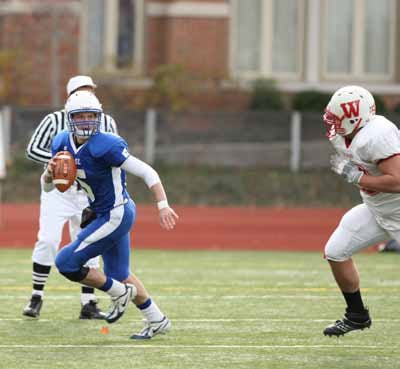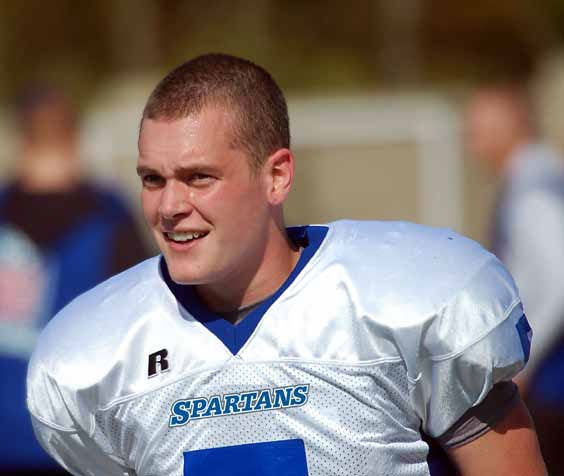everything i've learned here
Dan Whalen ’10 reflects on his college years as a journalism student and star quarterback

By Dan Whalen
Last December, Dan Whalen ended his recordbreaking career as a Spartan by being named an All-American for NCAA Division III. Many of his fans did not realize, however, that Whalen was also an English major. Whalen began his studies with Ted Gup, who until recently was the Shirley Wormser Professor of Journalism in the Department of English. As he prepared to graduate this spring, Whalen wrote about the mentors who have guided him on and off the field.
Ted Gup stood in front of the class, looking back at us through his silver-rimmed glasses, which he only put on, it seemed, when he had something especially important to say. A tiny gold hoop earring dangled from his left ear. With his right hand, he waved around a piece of chalk. I sat in the back of the room, my hands in the pockets of my high school varsity jacket, a winter hat on my head with melting ice and snow left over from my walk to the building. I felt unsure of myself in a class full of college students. They all had goals, and plans to reach those goals. I was just a 17-year-old who didn’t have a clue. I wasn’t sure what I wanted, or even what I should be looking for. Ted Gup fixed all that.
He didn’t know it then, and he may not know it today, but he was the main reason I ended up at Case Western Reserve University. Most of the time, I don’t expect blessings to come disguised as middle-aged journalism professors, but this blessing was the one that led to everything I would accomplish over the next four years.
His lecture that day was about an article which I believe was part of an investigative series in The Washington Post. The story described a young black boy who was being used by inner-city drug dealers as a runner, effectively reducing the risk that they’d be caught in the act. The debate in class that day was about whether the paper should release the boy’s name or withhold it. Ted spoke about the responsibility of journalists to be true to their calling and report the facts, but also to know when to exercise discretion and protect the innocent.
His charisma and eloquence captured me from that first college visit. As I witnessed Ted’s mastery of and passion for his craft, I was positive that I could succeed as a writer under his tutelage. If football could take me no further than my senior year of college, the lessons I’d learn from Ted would stick with me as long as my journalism career lasted.
That August, two days after my 18th birthday, I trotted onto the practice field with 32 other freshmen. Honestly, not one of us had the slightest idea what kind of legacy we’d leave behind four years later. We had no reason to think we’d do anything special; it had been more than two decades since a Case Western Reserve football team had done anything remotely noteworthy. In fact, most people around campus led us to believe that even though we could succeed in the classroom, we’d fail on the field. My freshman year would come and go as another mediocre year for a football program that some people around town didn’t even know existed.

wins, three straight perfect seasons and three straight National
Collegiate Athletic Association postseasons.
– – –
I remember sitting around the locker room one Sunday morning during my sophomore year, after our team had won six or seven games in a row. We had left the weight room and swung by the McDonald’s at the top of 115th Street for our usual supply of bacon, egg and cheese biscuits. Now we were waiting for our coaches to get the film ready to review.
Suddenly, senior linebacker Tom Brew, his mouth full of food, let out a muffled, “We’re gonna do this thing.” We all froze for a second, stopped chewing and looked around at each other. We knew exactly what he meant. The “thing” he was talking about was an undefeated season and the first playoff berth in the school’s history.
“D-Train! Get your butt over here and take your grade sheet!” Coach DiCarlo interrupted. That was a nickname he had given me after I had gotten my ears pierced a few weeks earlier. One of LeBron James’s many nicknames is “The L-Train,” and Coach D joked that I had officially made it big time now that I had fresh “bling.”
Most people who know Coach Dave DiCarlo know that he doesn’t have an unkind bone in his body. Just before my sophomore year, his wife of 49 years died after a long battle with cancer. When Coach Greg Debeljak asked him to come on as our quarterback coach, he went back and forth on his decision for a few long months. He wasn’t sure he could give his full effort; his wife’s passing had exhausted him both mentally and physically. But he took on the assignment as a form of therapy, as a way to pass the time and maybe get back into a healthy frame of mind.
From there, we didn’t just begin a relationship between a coach and player; we started a friendship. He needed the game just as much as I did. He’d been coaching football at one level or another for the past 40-plus years, and I’d been playing since I was old enough to buckle a chinstrap. We knew that together we would build a strong bond. He’d help me become a better quarterback; I’d help him get through the toughest time of his life. And we’d both be better people in the end.
I took my grade sheet, which was broken down into two categories: technique and assignment. I could get two points per play in each category. As I did every week, I flipped directly to the back page and checked my composite average. I can’t remember the grade, but I know it was below 90 percent, because it took me 30 starts before I cracked that ceiling. Coach D graded me tough in order to make me reach my full potential.
After I read over my grades each week, we would watch the game film together and then rewind it, over and over and over. Typically, we would stop every few minutes and get sidetracked talking about God, or politics, or women, anything that would chop up the two-hour film review. Mostly, though, we just talked like friends, or like a grandfather and grandson. Today, after all the passing records Coach D has helped me attain, all the victories we’ve shared together, and all the nicknames he has given me, the kind of person he’s helped me become trumps them all.

– – –
It was through Coach DiCarlo that I met one of the smartest, most well-respected men in the National Football League. It is unfortunate that Sam Rutigliano is best remembered for the 1980 AFC Championship game, where he chose to go for the touchdown instead of kicking the field goal to win. Everyone from Cleveland remembers that play: “Red Right 88.” Pass intercepted, game over. Another almost Super Bowl. “I’d call the same play again,” Sam told me. “Just with a different outcome.”
Now here I am in the final months of my college experience, four years of football have come and gone faster than I’d ever imagined, and the 1980 NFL Coach of the Year is telling me that I have a legitimate chance to play in that league.
I am sitting in an Arabica coffee shop in my hometown of Willoughby, Ohio, when Sam comes walking in with a folder full of newspaper clippings and things he wants to talk to me about.
Sam’s Brooklyn accent is wise, and it is also deeply Italian. After 30 years of coaching at the NFL level, he knows a thing or two about what they want out of a quarterback. At nearly 80 years old, he is still as sharp as he was in his 20s, and because of his active life in the Catholic Church, his word is as good as gold across his countless relationships. Our usual meeting place is in the Little Italy neighborhood just off campus, but on this day, we are getting together on my turf to discuss what exactly I need to do to make the jump to the highest level of professional football.
He asks me if I want something to eat. I politely decline. A few minutes later, he comes back with a softball-sized chocolate cupcake and says, “Here, bulk up.” Hospitality and generosity are just in his nature, and the one-liners never stop. But when Sam talks, people listen. He’s one of those people whose presence captures a room. “If I had 10 minutes with Braylon Edwards,” he says, referring to the ex-Browns receiver, “I’d take him into a phone booth and straighten him out. He doesn’t know whether the ball is filled with air or stuffed.” Sam tells me he’d be willing to help out with anything I need over the next few months, football related or not. He accepts phone calls about me, he makes phone calls for me, and he still takes time out each week to meet for a few hours to make sure everything is going ok.
– – –
If not for that visit to Ted Gup’s class in January 2006, it is likely that I would have ended up joining Ohio University’s football team and trying to get into journalism school there. I would never have experienced what I have during the last four years—leading a football program to 31 straight regular season wins and three playoff berths, and capping it all off by being named a first team All-American. Coach DiCarlo would never have entered my life, and Sam Rutigliano would have had no reason to help me reach my goal of playing in the NFL.
I catch plenty of grief from my teammates, who say that being an English major is a pushover. Many of them are majoring in organic chemistry and biomedical engineering. But writing is something I like to do—something I’m passionate about. When I graduate with my degree in English this May, either I’ll be heading to an NFL training camp with a whole new journey in store, or, at the very worst, I’ll have the chance to put everything I’ve learned here to work as a sports journalist. Not a bad plan B, if you ask me.
